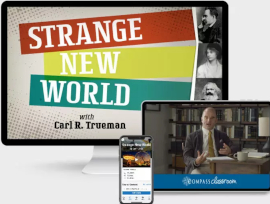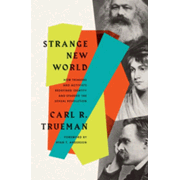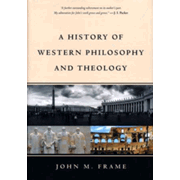Compass Classroom's course titled Strange New World is based on Carl Trueman's influential book The Rise and Triumph of the Modern Self which explains how philosophical ideas have shaped our modern culture around sexual identity and untethered individuality. As the course states in its notes to both teachers and students, "In the foreword of the book, Ryan Anderson helpfully summarizes the book's argument as ‘an account of how the person became a self, the self became sexualized, and sex became politicized.'"A Christian professor of church and intellectual history, Trueman helps students understand these ideas from a Christian worldview.
Trueman makes the ideas in his book more accessible through this video course and a simplified version of his book, Strange New World: How Thinkers and Activists Redefined Identity and Sparked the Sexual Revolution, which is half the length of the original book. (The book must be purchased separately by course participants.) Trueman also created a study guide and videos (published by Crossway) that can be used by church groups. Compass Classroom has expanded Trueman's work and incorporated the videos and study guide (adapted for the homeschooling audience) into this online course.
Because of the sexual issues discussed, this course should be used by mature eleventh and twelfth graders. Parents should read through the cautions provided by Compass Classroom before students enroll. Since the course delves into hot-button topics, it should also be of interest to those beyond the high school level.
A substantial amount of reading is required since students read the book Strange New World, excerpts from primary sources and other literary works (included in the online course), and optional selected readings from John Frame's 928-page A History of Western Philosophy and Theology. (This book also must be purchased separately.) Frame's book is also used with Compass Classroom's course, Philosophy: Consequences of Ideas, and those taking both courses should invest in it. Otherwise, I would recommend purchasing it only if you have a student who really wants to go deeper into the history of philosophy or if you want a student to invest extra hours toward a full course credit.
How It Works
The course introduction includes a brief video and information for both students and parents. Each of the nine lessons that follow include a video lecture, a chapter to read from the book Strange New World, supplementary readings for some lessons, "study" questions, essay questions, and an online quiz. Students can do additional reading and research as recommended in the course. The conclusion to the course includes a brief video and a Bible study.
Trueman's video lectures run for about 10 to 12 minutes. He explains and illustrates key ideas from each chapter of his book as he explores the roots and development of modern attitudes toward sex and gender.
After watching the video, students read the assigned chapter from Strange New World. The reading assignment page in the online lesson plan includes video clips, short documentaries (such as PragerU videos), important quotes from the book, and occasional additional readings from other sources. Videos and readings are sometimes followed by a question or two to answer. These videos, readings, and questions are important for developing Trueman's line of argument and should not be skipped. The lesson plan for the "reading" portion of each lesson concludes with an online quiz with five to ten questions. Quizzes are automatically scored, and students can retake them to improve their scores. (I found that the study questions in the next section sometimes clarified understanding of quiz questions, so students might want to come back to take the quiz after working through the study questions.)
After the quiz are study questions—15 to 33 per lesson. Questions require comprehension of the course content presented in the book and videos, but they go far beyond comprehension. Students read Bible passages before answering questions, such as this from Lesson 5 based on the student's reading of 1 Corinthians 5: 1-5: "8. Is it possible for churches today to exert biblical church discipline, given the tendency toward a consumerist mentality in our world of ecclesiastical fragmentation and expressive individualism?" Some questions require students to think deeply about what they have learned and form their own ideas and opinions as with these two study questions from Lesson 5: "7. Is it possible to have religious freedom without the kind of ecclesiastical chaos we now witness in the West?" and "12. Is patriotism legitimate? When does patriotism become nationalism? Can we be proud of our country while still respectful of other nationalities?"
Many of the questions would be great for discussion in a group class or with parents, but students can write out answers to all of them if no discussion option is available. (It might take quite a while to write out all of the answers!) There are no answer keys for study questions since most are open-ended.
Three to six essay questions requiring lengthier responses are presented either after the quiz or later in the lesson. Most have more than one part. For instance, the third question for the first lesson asks, "What is expressive individualism? Do you recognize it in yourself? In what ways?" Under the questions is a link to sample answers. Students should write their own answers without consulting the sample answers. Like the study questions, many of these will not have predictable answers. Both study and essay questions are challenging, but assigning some as study questions, with an expectation they will be used for discussion, and others as essay questions requiring written answers greatly lessens the amount of writing required.
Some lessons include one or two readings from philosophers mentioned by Trueman. The readings are presented through the course platform or downloaded from links, and students can use whichever they prefer.
Many lessons have one Go Deeper section—the third lesson has three separate Go Deeper sections and lessons four through six have none—where students are assigned readings from A History of Western Philosophy and Theology or other written works such as the poem "Mont Blanc" by Percy Bysshe Shelley (Lesson 2), an excerpt from Oscar Wilde's "The Soul of Man Under Socialism" (Lesson 3), and two Supreme Court decisions (Lesson 8). There are no questions in the Strange New World course based on these readings. Although not presented as a Go Deeper section, Lesson 5 assigns the reading of chapters 5 and 6 from Deuteronomy, followed by a question for which students are to write or discuss their answers.
Students will write out answers to questions in a notebook or on a computer. Students can earn at least a half credit for humanities, philosophy, or worldview. It seems to me that students who write out answers to all questions and complete all of the reading, including from Frame's book, might earn a full credit because of the time required.
Students can work independently through the course with the easy-to-follow online lessons, but they are likely to benefit most (and find the amount of writing more manageable) if they can participate in a group for discussion of the study questions. Students should watch the video at the beginning of each lesson, but in a once-a-week group class they might rewatch the video and discuss the questions. Those in group classes still write answers to the essay questions, and parents can evaluate their responses based on the sample answers supplied in the course. (The publisher offers group class licensing options.)
Summary
Strange New World does an outstanding job of teaching a topic that might be one of the most important for young people to study. This course helps them understand why people struggle with gender identity, why those choosing non-traditional gender identities demand that others acknowledge and support their choices, and why fluid gender identities defy both natural law and biblical truths.











